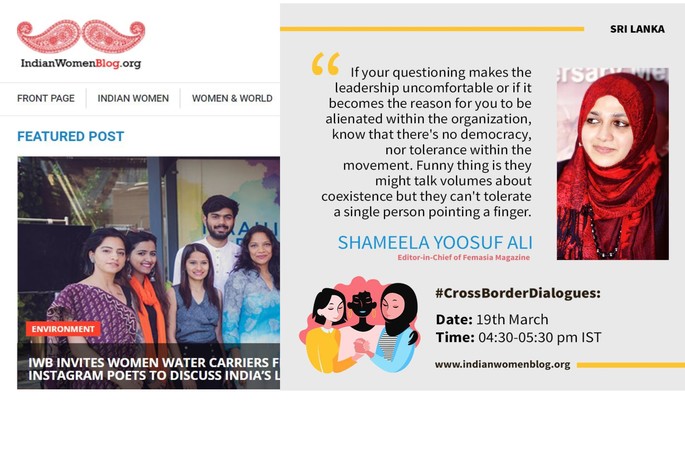IWB or Indian Women Blog is an online media portal that talks about the success stories of women across the world and conducts creative campaigns to shatter the stereotypes. IWB had organised a series of engaging conversations via Twitter dialogues with women leaders, thinkers and change-makers from across South Asia. We are proud to present you the interview IWB had with FemAsia’s Editor-In-Chief.
Editor-In-Chief at @FemAsiaMagazine, @Ms_Shameela is a feminist writer, researcher and voice of many women and marginalised minorities in Asia. With her, we will be continuing our live series of #CrossBorderDialogues
We welcome Shameela Yoosuf Ali to our #CrossBorderDialogues . Here’s our opening question: You often express your views against pseudo women’s empowerment. How do you think it threatens the entire women’s cause?
I would define ‘Women’s empowerment’ in simple terms: women gaining power and control over their own lives and their freedom to make their own choices.
A considerable number of women across the world still are prisoners within their own patriarchal systems. They are abused physically, verbally and emotionally, with no proper support system to turn to.
When we look at the west, women still experience the same stereotypes and face commodification and sexualisation – sadly, sometimes in the name of ‘Women empowerment’.
It is ironic that some pseudo-feminists feel liberating women from hardcovers is true freedom. True freedom lets women choose what they wear and not dictate what they should and shouldn’t do.
Though we all stand as one, our cultures differ, our nuances differ, and our problems differ. Everyone should speak for themselves. That’s why it’s vital not to shrink the whole idea of W.E. into a small box. One dominant narrative could hijack the entire women’s cause.
I believe that there are multiple versions of ‘Women’s empowerment rather than one dominant version.
What is the version of women’s empowerment that is the need of the hour in South Asia?
There is no one size fit for all kind of empowerment. I think we all need to define what kind of empowerment we need, considering our settings, priorities and needs.
We second that. We also need to consider the bigger aim here, i.e. to co-exist in peace and harmony.
Exactly, we cannot compromise in co-existence.
How can the current patriarchal narrative be subverted by focusing on the multiplicity of voices instead of a linear, one-sided approach to the same?
I believe that patriarchal narratives also differ, from culture to culture, religion to religion and country to country. So you cannot address every issue affecting women with one single story. Women must stand up against patriarchy and address their own problems related to their culture, religion and locality. Because they are the ones who know best about their cultural nuances and artefacts. The need to create strong and effective counter-narratives is very important in deconstructing the current patriarchal narratives.
What is your counter-narrative as a woman community leader in Sri Lanka?
This is a tricky question, and I do not want to frame myself into a single narrative. In my opinion, Muslim women are faced with two challenges.
The struggle within their own communities against sexism
The battle against so-called saviours who are prejudiced and ready to go to any heights to liberate and save Muslim women from oppression. So, as a writer and journalist, I try to raise my voice against the two points I mentioned as well as being open to other narratives.
Let’s discuss a little more on how damaging this obsession with the victimisation of women where it is simply assumed that they need to be ‘saved’ from something or someone?
The aftermath of 9/11framing of Muslims in mainstream media drastically changed, resulting in a change in people’s attitudes towards them. Feelings of alienation and otherness have increased. I think it can be compared with anti-Semitism. ‘Muslim Women’ is often correlated to tags such as oppressed, subjugated and ‘behind the times. What we should understand is that we are not a homogenous, fixed group. This is where the need for counter-narratives arise. If you want to save some group from oppression, let them come forward and speak for themselves.
Very well said! As a community, it is our responsibility to stand by them when they speak for themselves. Please talk more about the rhetoric of cultural oppression in Sri Lanka.
Sri Lanka once was praised for becoming the first country with a woman Prime Minister.
Cultural oppression is a kind of social control that affects every aspect of a minority group. In the recent past, in my motherland, cultural oppression has increased in many folds. With the rise of Sinhala Nationalism and the spread of religious extremism, things have become worse. I think, within the majority Sinhala community, the oppression of women has increased as well as all the other communities. On the other hand, some religious orthodoxies fanatically try to homogenise all aspects of society, from the minority communities. Post 9/11 upsurge of Islamophobia has a tremendous impact on how Muslims and esp Muslim women are perceived in Sri Lanka.
How can we collectively work towards undoing these flawed perceptions about Muslim women?
It is a long road and sometimes exhausting. These flawed perceptions of Muslim women are universal. Sometimes this alienation can lead to radicalised measures. We need to understand, empathise as well as make people aware through our narratives and literature.
In South Asia, religion has long served the purposes of patriarchy. How do you think can we address the conflict of religion and liberal views on women’s empowerment?
Well, it is a very interesting and important question
Gender bias is deeply embedded in many cultures. Women are alienated from many political, social and religious institutions across the world. Religious conservatism safeguards its power by imposing conformist measures of restrictions on women. Every religion has its own share. I think we cannot altogether denounce religious faith again; that would be one narration. We need to go into history and try to re-read our sacred texts.
As a Muslim woman, I feel we were long neglected in the activities of social and religious movements. We seldom take part in the active decision-making process and leadership of the organisations. It is clearly against the tradition of the Prophet.
We need to prioritise the meaning and interpretation of the Quran and Hadith rather than simply reading the text to comprehend its meaning and practice the views of Islamic philosophy. Likewise, people should come forward to redefine the meaning of their own faith and religion. We all need to find our voice within our own communities against patriarchy. I think awareness must grow, and conversations should take place.
What are those long-neglected and unspoken themes that you have been bringing up through your magazine and want to share in this conversation?
To be precise, at FemAsia, we try to talk about Untalked.
We are bound to bring multiple narratives for every issue which affects women.
In the Culture & Politics section, we discuss Corporatized Knowledge, Religious and cultural conservatism, Neoliberal exploitation, Commodification of the female body, etc. Through the Fictional Arts section, we portray a wide range of art, poetry and fiction related to women and vulnerable people. In the Empowerment section, we share ideas related to Women empowerment and bring to light women who are change-makers in their societies.
As you invite entries from around the world for your magazine, what is that one recurrent sentiment that you often come across in women’s writings?
I love this question!
The hope and power to rise against all the odds; and empathy towards humanity.
On that note, New Zealand Prime Minister Jacinda Ardern has set a great example of compassionate leadership through her reactions to the Christ church Terror Attack. With the same in perspective, how do you think can women’s leadership bring humane solutions to all the political chaos in South Asia?
I truly admire Jacinda Ardern. I wouldn’t be wrong to say that women are much more emotionally capable and empathetic than men. Historically, in our parts of the world, women as mothers, wives and daughters have handled entire families single-handedly. Why cannot they make great leaders and changemakers? I think that women leaders will bring a whole new paradigm – empathy-centric leadership – into the world. The world tends to think of compassion as a weak leadership trait. But I believe it takes courage to be empathetic among all this chaos and catastrophe.
According to you, how far has the idea of intersectional feminism advanced in South Asia? Is the concept truly understood or accepted in the region?
The whole purpose of intersectional feminism is to listen to different kinds of voices and narratives about feminism. I think South Asian countries, with their varying cultural shades, are in the dawn of embracing intersectional feminism.
Co-existing among different cultural and religious settings and understanding the distinctions divergences, south Asian women find it easier to adopt. But they might not know the word denoted yet since ‘Intersectional feminism is a relatively new concept.
What are your thoughts on employing intersectionality as a peace-making strategy in South Asia?
Intersectionality is a useful strategy for linking all the grounds of discrimination, and it could be employed as a peacemaking strategy. But then it is a broad concept, and we each need to read and analyse and see how it works for our own country.
To conclude our chat, what would be your message to the entire South Asian community?
I would say that the world’s most untapped or wasted resource is the female population. They are deprived of their identities. Their voices are suppressed. To Men – Please treat women as your fellow human beings and companions, and let them be themselves and live their lives. Trust them. To Women – let us work together to empower and enrich our lives, and let us stand as one group against all kinds of discrimination with compassion and vigour.
Thank you, Shameela Yoosuf Ali, for joining us in our #crossborderdialogues. It was a really informative chat, with a lot of insights to ponder upon.
My pleasure.
As an online platform that portrays success stories of women across the world & conducts campaigns to break stereotypes, IWB, you are doing a tremendous job. Let us connect and enrich each other on this long journey!
Thank you for the encouragement. We all need to stand together to progress the cause of women’s empowerment and equality.



